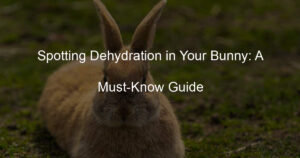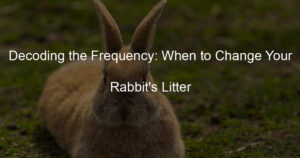
Introduction to Lionhead Rabbit Care
Welcome to our comprehensive guide on Lionhead Rabbit Care. In this section, we will dive into understanding these adorable creatures and why they make such great pets.
-
Understanding Lionhead Rabbits: Origin and Characteristics
Lionhead Rabbits are a unique breed that originated in Belgium. They are known for their distinctive mane of fur around their head, which resembles a lion’s mane, hence the name. These rabbits are small in size, typically weighing between 2.5 to 3.75 pounds. They have a friendly and playful nature, making them an excellent choice for a family pet.
Characteristics Details Origin Belgium Weight 2.5 to 3.75 pounds Personality Friendly and Playful -
Why Lionhead Rabbits Make Great Pets
Lionhead Rabbits are not just cute and cuddly; they also have a lot to offer as pets. They are known for their friendly and sociable nature. They enjoy the company of humans and can form strong bonds with their owners. Their small size makes them easy to handle and care for, even for children. Additionally, they are intelligent and can be trained to use a litter box, making them a clean and convenient pet to have around the house.
As a famous quote says, “A house is not a home without a pet”, and a Lionhead Rabbit could be the perfect addition to your family.
First Time Rabbit Owner: What to Expect
Stepping into the world of rabbit ownership can be an exciting journey filled with joy and challenges. As a first-time rabbit owner, it’s crucial to understand what to expect and prepare accordingly. This section will cover the responsibilities of a rabbit owner and address some common misconceptions about rabbit ownership.
- Responsibilities of a Rabbit Owner
Being a rabbit owner is not just about cuddling and playing with your fluffy friend. It involves a lot of responsibilities that you need to be aware of:
- Feeding: Rabbits require a balanced diet of hay, fresh vegetables, and a small number of pellets. They also need access to clean water at all times.
- Exercise: Rabbits are active animals that need plenty of exercise. They should have a safe and spacious area to hop around and explore.
- Healthcare: Regular vet check-ups are essential to ensure your rabbit is healthy. It’s also important to keep an eye out for any changes in their behavior or eating habits, as these could indicate health issues.
- Grooming: Depending on the breed, some rabbits may require regular grooming to keep their fur clean and prevent matting.
- Training: Rabbits can be trained to use a litter box, which can make cleaning easier. They can also learn simple commands with patience and positive reinforcement.
- Common Misconceptions About Rabbit Ownership
There are several misconceptions about rabbit ownership that can lead to unrealistic expectations:
- Rabbits are low-maintenance pets: Contrary to popular belief, rabbits require a lot of care and attention. They need a balanced diet, regular exercise, and mental stimulation to stay healthy and happy.
- Rabbits don’t live long: With proper care, rabbits can live up to 10-12 years. This is a long-term commitment that should not be taken lightly.
- Rabbits are good pets for young children: While rabbits can be gentle and loving, they are also delicate and can be easily frightened or injured. They require careful handling and may not be suitable for young children.
Understanding these responsibilities and misconceptions can help you prepare for the rewarding journey of rabbit ownership. Remember, every rabbit is unique and will require your time, love, and understanding to thrive.
Bunny Care Guide: Basic Needs
When it comes to caring for your bunny, understanding their basic needs is crucial. One of the most important aspects of bunny care is their diet. Let’s delve into the dietary needs of your Lionhead rabbit.
Dietary Needs
Just like humans, rabbits have specific dietary needs that must be met for them to thrive. Let’s explore what these needs are and how you can ensure your bunny gets the right nutrition.
-
Understanding a Rabbit’s Diet
Rabbits are herbivores, which means they eat plants. Their diet mainly consists of hay, fresh vegetables, and a small amount of pellets. Hay should make up about 70% of their diet as it helps in digestion and prevents obesity. Fresh vegetables provide vitamins and minerals, while pellets are a concentrated source of nutrients.
Food Type Percentage of Diet Hay 70% Fresh Vegetables 20% Pellets 10% -
Feeding Your Lionhead Rabbit
When feeding your Lionhead rabbit, it’s important to keep their size in mind. A Lionhead rabbit is smaller than most breeds, so they require less food. A good rule of thumb is to provide 1/4 cup of pellets for every 5 pounds of body weight. Always ensure that fresh water is available for your bunny.
Remember, a balanced diet is key to a healthy rabbit. Overfeeding can lead to obesity and other health issues. If you notice any changes in your rabbit’s eating habits or weight, it’s important to consult with a vet.
Exercise and Play
One of the most important aspects of caring for a Lionhead rabbit is ensuring they get plenty of exercise and play. This not only keeps them physically healthy but also mentally stimulated. Let’s delve into this topic further.
- Importance of Exercise for Rabbits
Exercise is crucial for rabbits. It helps to keep their bodies strong and their minds sharp. Rabbits are naturally active creatures. In the wild, they spend a lot of their time running, jumping, and burrowing. This level of activity helps to keep their muscles toned and their bones strong.
Without regular exercise, a rabbit can become overweight, which can lead to a host of health problems. Lack of exercise can also lead to boredom and depression in rabbits. They need mental stimulation just as much as they need physical activity.
So, how much exercise does a rabbit need? Ideally, a rabbit should have at least 3-4 hours of exercise per day. This can be split into multiple sessions throughout the day. Remember, the more active your rabbit is, the happier and healthier they will be.
- Safe Toys for Your Bunny
Just like children, rabbits love to play with toys. Toys provide mental stimulation and help to keep your rabbit’s teeth in good shape. However, not all toys are safe for rabbits. Here are some safe toys that your bunny will love:
| Toy | Description |
|---|---|
| Wooden Blocks | These are great for rabbits to chew on and toss around. Just make sure the wood is untreated and safe for rabbits. |
| Cardboard Boxes | Rabbits love to hide and play in cardboard boxes. You can cut holes in the box to make it more fun for your bunny. |
| Plastic Balls | These can be fun for rabbits to push around and play with. However, make sure the ball is too big for your rabbit to swallow. |
Remember, the best toy for your rabbit is one that they enjoy and that is safe for them to use. Always supervise your rabbit when they are playing with toys to ensure they are not ingesting anything harmful.
Adopting a Lionhead Rabbit: Things to Consider
Adopting a Lionhead Rabbit is a big decision. It’s not just about how cute they are, but also about how well they fit into your lifestyle. Here are some important factors to consider before you bring a Lionhead Rabbit into your home.
- Choosing the Right Rabbit for Your Lifestyle
- Adoption vs. Buying from a Breeder
Before adopting a Lionhead Rabbit, it’s crucial to consider your lifestyle. These rabbits are known for their playful and friendly nature, but they also require a lot of care and attention. They need daily grooming due to their long fur and plenty of playtime for their active minds.
If you have a busy schedule or are rarely home, a Lionhead Rabbit might not be the best choice for you. On the other hand, if you have plenty of time to devote to a pet and enjoy interactive play, a Lionhead Rabbit could be a great companion.
Another important decision is whether to adopt a rabbit or buy from a breeder. Adoption is a wonderful way to give a rabbit a second chance at a happy life. There are many rabbits in shelters that need loving homes. Adopting can also be less expensive than buying from a breeder.
However, if you’re looking for a specific breed like the Lionhead, buying from a reputable breeder might be your only option. Breeders can provide you with detailed information about the rabbit’s background and health. But remember, buying from a breeder is usually more expensive and doesn’t help the overpopulation problem in shelters.
In conclusion, adopting a Lionhead Rabbit requires careful consideration of your lifestyle and the pros and cons of adoption versus buying from a breeder. By taking the time to make an informed decision, you can ensure that you and your new pet will have a happy and healthy life together.
Preparing for a Lionhead Rabbit: Home Setup
When preparing to bring a Lionhead rabbit into your home, one of the most important steps is setting up the right living space. This includes choosing the right cage, which is a crucial part of your rabbit’s home setup. Let’s dive into the details.
Choosing the Right Cage
Choosing the right cage for your Lionhead rabbit is not as simple as picking the first one you see in the pet store. There are a few key factors to consider, including the size and design of the cage, and its location in your home.
- Size and Design Considerations
- Location in Your Home
The cage for your Lionhead rabbit should be spacious enough for them to move around comfortably. As a rule of thumb, the cage should be at least four times the size of your rabbit when they’re fully stretched out. This gives them enough room to hop, stretch, and play. The design of the cage should also be considered. It should have a solid floor to protect your rabbit’s feet, and it should be easy to clean. A cage with a removable tray at the bottom is a good choice.
The location of the cage in your home is another important factor. It should be placed in a quiet, safe, and comfortable area. Avoid locations near loud noises, direct sunlight, or drafts. Your rabbit should feel secure and comfortable in their cage, so consider placing it in a room where you spend a lot of time. This way, your rabbit will feel more included in the family activities and less isolated.
In conclusion, preparing a suitable home setup for your Lionhead rabbit involves careful consideration of the cage’s size, design, and location. With these factors in mind, you can create a comfortable and safe environment for your new furry friend.
Creating a Safe Environment
Ensuring a safe environment for your Lionhead rabbit is a crucial step in preparing your home. This involves rabbit-proofing your home and deciding whether your rabbit will live indoors or outdoors. Let’s delve into these two important aspects.
- Rabbit-Proofing Your Home
- Secure all electrical cords with cord protectors or hide them away. Rabbits love to chew, and electrical cords can be a dangerous temptation.
- Keep small objects, toxic plants, and chemicals out of reach. Rabbits can accidentally ingest these items, leading to serious health issues.
- Block off unsafe areas like stairs and balconies using baby gates or barriers.
- Outdoor vs. Indoor Living
Creating a rabbit-proof home is essential for your pet’s safety and your peace of mind. Rabbits are curious creatures and can get into trouble if left unsupervised. Here are some tips to help you rabbit-proof your home:
Deciding where your rabbit will live is another important consideration. Both indoor and outdoor living have their pros and cons.
| Indoor Living | Outdoor Living |
|---|---|
| Indoor rabbits are safe from predators and harsh weather conditions. They also have more opportunities for social interaction. However, they require more attention to rabbit-proofing. | Outdoor rabbits have more space to explore and exercise. However, they are exposed to weather extremes, predators, and potentially harmful insects. |
Ultimately, the choice between indoor and outdoor living depends on your living situation, climate, and personal preference. Remember, the most important thing is that your rabbit feels safe, comfortable, and loved.
Lionhead Rabbit 101: Understanding Their Behavior
Understanding the behavior of your Lionhead Rabbit is crucial for a healthy and happy relationship. Rabbits have a unique language of their own, and interpreting their actions can help you cater to their needs better. In this section, we will explore common rabbit behaviors and how to handle a Lionhead Rabbit.
- Common Rabbit Behaviors and What They Mean
Rabbits communicate through a variety of behaviors. Here are some common ones:
| Behavior | Meaning |
|---|---|
| Binky | This is a joyful leap into the air, often accompanied by twisting the body. It’s a sign of happiness and contentment. |
| Thumping | Rabbits thump their hind legs when they sense danger. It’s a warning to other rabbits and a sign of fear. |
| Nudging | If your rabbit nudges you with its nose, it’s asking for attention or indicating it wants something. |
| Chinning | Rabbits have scent glands under their chins. When they rub their chin on something, they’re marking it as their territory. |
- How to Handle a Lionhead Rabbit
Handling your Lionhead Rabbit correctly is essential to avoid causing them stress or harm. Here are some tips:
- Approach Slowly: Quick movements can scare your rabbit. Approach them slowly and calmly.
- Don’t Pick Up From Above: Rabbits are prey animals, and being picked up from above can trigger their fear instincts. Instead, get down to their level and let them come to you.
- Support Their Body: When you do pick up your rabbit, make sure to support their entire body, especially their hind legs.
- Respect Their Boundaries: If your rabbit shows signs of discomfort or fear, put them down and give them some space.
Understanding and respecting your Lionhead Rabbit’s behavior is key to building a strong bond with them. Remember, patience and consistency are your best friends when it comes to rabbit care.
Rabbit Ownership Tips: Health and Wellness
Keeping your Lionhead rabbit healthy and happy is a crucial part of responsible ownership. This section will provide you with essential tips on maintaining your rabbit’s health and wellness, focusing on the importance of regular vet checkups and common health issues in Lionhead rabbits.
Regular Vet Checkups
Just like humans, rabbits also need regular health checkups. These visits to the vet are vital in ensuring your rabbit is in good health and can help detect any potential issues early.
- Importance of Regular Vet Visits
- Common Health Issues in Lionhead Rabbits
Regular vet visits are essential for a few reasons. Firstly, they allow the vet to monitor your rabbit’s weight and overall health. Secondly, these visits provide an opportunity for the vet to detect any potential health issues early. Early detection can often lead to more effective treatment and a better prognosis. Lastly, regular vet visits are a great time to ask any questions you may have about your rabbit’s health or behavior.
Lionhead rabbits, like all breeds, can be susceptible to certain health issues. Some common health problems include dental disease, gastrointestinal stasis, and respiratory infections. Regular vet checkups can help detect these issues early and provide appropriate treatment.
| Common Health Issue | Symptoms | Prevention |
|---|---|---|
| Dental Disease | Loss of appetite, drooling, weight loss | Provide a diet high in hay to wear down teeth |
| Gastrointestinal Stasis | Reduced appetite, fewer droppings, lethargy | Ensure a diet high in fiber and encourage exercise |
| Respiratory Infections | Sneezing, discharge from nose or eyes, difficulty breathing | Keep living areas clean and avoid drafts |
Remember, the key to a healthy rabbit is prevention. Regular vet checkups, a balanced diet, and a clean living environment can go a long way in preventing these common health issues.
Grooming Your Rabbit
Proper grooming is a crucial part of your Lionhead rabbit’s health and wellness. It not only keeps your rabbit looking good, but also prevents potential health issues. Let’s explore two key aspects of rabbit grooming: brushing the fur and trimming the nails.
- Brushing Your Lionhead Rabbit’s Fur
- Choose the Right Brush: Use a slicker brush or a comb designed for small animals. These tools can effectively remove loose fur without hurting your rabbit.
- Brush Gently: Always brush in the direction of the fur growth. Start from the head and move towards the tail. Be gentle to avoid hurting your rabbit.
- Check for Parasites: While brushing, look for signs of parasites like fleas or mites. If you spot any, consult your vet immediately.
- Trimming Your Rabbit’s Nails
- Prepare Your Tools: You’ll need a pair of nail clippers designed for small animals. Also, keep a styptic powder handy to stop bleeding in case you accidentally cut the quick.
- Hold Your Rabbit Safely: Have someone hold your rabbit while you trim the nails. Make sure your rabbit is calm and comfortable.
- Trim Carefully: Cut the nail just before the quick (the pink part inside the nail). If you’re unsure, it’s better to trim less rather than risk cutting into the quick.
Brushing your Lionhead rabbit’s fur is an essential grooming activity. Lionhead rabbits are known for their distinctive, fluffy manes, which require regular brushing to prevent matting and tangling.
Here’s a simple guide to brushing your rabbit’s fur:
Just like their fur, a rabbit’s nails also require regular care. Overgrown nails can cause discomfort and even lead to injuries. Here’s how you can trim your rabbit’s nails safely:
Remember, grooming is a bonding activity that can help you build a stronger relationship with your rabbit. Always be patient and gentle during grooming sessions. If you’re unsure about any aspect of grooming, don’t hesitate to consult your vet or a professional groomer.
Caring for Your First Bunny: Emotional Needs
When it comes to caring for your first bunny, it’s not just about providing food, water, and a comfortable habitat. It’s also about understanding and meeting their emotional needs. Rabbits are social animals with complex emotional lives, and they need more than just physical care to thrive.
- Understanding Your Rabbit’s Emotional Needs
- Building a Bond with Your Rabbit
Rabbits are intelligent, curious, and social animals. They have a wide range of emotions and can feel happiness, love, fear, and stress. Understanding these emotions is key to providing your rabbit with the care they need.
For instance, rabbits need social interaction to stay happy and healthy. They can get lonely if left alone for too long. They also need mental stimulation. Providing toys, puzzles, and opportunities for exploration can help keep your rabbit mentally engaged and prevent boredom.
It’s also important to recognize signs of stress in your rabbit. Changes in behavior, such as hiding, aggression, or loss of appetite, can indicate that your rabbit is feeling stressed or anxious. If you notice these signs, it’s important to identify and address the cause of the stress.
Building a bond with your rabbit is another crucial aspect of their emotional care. This bond is built on trust and understanding. Spend time with your rabbit each day, talking to them, petting them, and playing with them. This will help your rabbit feel safe and loved.
Remember that building a bond takes time and patience. Rabbits are naturally cautious animals, and it may take time for them to trust you. Be patient and consistent in your interactions with your rabbit, and over time, they will come to see you as a trusted friend.
In conclusion, caring for a rabbit’s emotional needs is just as important as caring for their physical needs. By understanding your rabbit’s emotions and building a strong bond with them, you can help ensure that your rabbit leads a happy, healthy, and fulfilling life.
Conclusion: Embracing the Joy of Rabbit Ownership
As we wrap up this comprehensive guide on Lionhead rabbit care, let’s take a moment to revisit some of the key points we’ve covered. We’ll also share some final thoughts and words of encouragement for those considering or just starting their journey as rabbit owners.
- Recap of Key Points
- Final Thoughts and Encouragement
Throughout this guide, we’ve learned about the unique characteristics and needs of Lionhead rabbits. We’ve covered everything from their basic needs, such as diet and housing, to understanding their behavior and emotional needs. We’ve also touched on important health and wellness tips, and factors to consider before adopting a Lionhead rabbit.
Embracing the joy of rabbit ownership can be a rewarding experience. While it may seem daunting at first, remember that with the right knowledge and preparation, you can provide a loving and nurturing home for your furry friend. As a rabbit owner, you have the opportunity to form a special bond with a creature that is both charming and full of personality.
Remember, every rabbit is unique and may require different levels of care and attention. But with patience, love, and understanding, you’ll soon find that the joy and companionship they bring into your life far outweigh the challenges. Here’s to the start of a wonderful journey with your Lionhead rabbit!




